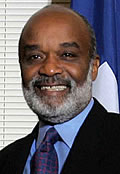Le livre intitule INDEPENDANCE 2011
< Previous | Home | Next >
Hello
In my previous e-mails, I made an attempt to introduce you to my book entitled "Independance 2011"
After having read a couple of words, you were probably and understandably left perplexed and wondering: what' is in it for me?
How is a message from a Haitian national to his fellow Haitians germane to others?
Well
The message is a universal one imparting scholarly findings in relation to the role of leaders, followers and organizational goals in the context of "company politics"
In fact, despite the evident privileges that some organizational members seem to enjoy to the detriment of others, scholarly dissection of formal authority and organizational politics remains embryonic.
Therefore, superiors and subordinates alike take advantage of this state of ambiguity in organizational life to achieve both myopic and organizational goals.
The primary purpose here is to dissociate political behaviors from organizational prerogatives associated with position and rank.
Organizational politics is ubiquitous.
Throughout the world, organizational participants exhibit political behaviors for diverse reasons.
It seems evident that the distribution of advantages and disadvantages is at the forefront of political behaviors' motives.
Since organizational values, rules, and regulations failed to address all aspect of organizational life, politics become the recognized but unofficial surrogate.
This book will help decipher the consequences that emanate from unethical uses of organizational politics and expose the implications for leaders, followers, and organizational goals.
Two situations, leading to different and opposite outcomes, provided by the journey of a combat support hospital deployed to Iraq will serve as illustrations.
The particular treatments given to the soldiers in both cases by the chain of command throughout the length of stay are thought provoking.
I am using a qualitative observation approach of a military environment.
The quotidian operations within this environment furnish several scenarios.
After careful examinations of the scenarios, two have been selected to capture a wider spectrum of disparities.
A comparative analysis of these two scenarios and examples emphasizes the contextual involvements of leaders and followers and sheds lights on the nature of their relationships and on their respective stances with respect to organizational objectives.
The resulting observations generalized and applied to all types of organizational firms broaden the implications of the findings.
It is safe to assert that most organizations provide standard operation procedures, guidelines, and values necessary for their workforce to carry out their duty. For the most part, organizational values that are designed to guide the behaviors of leaders and followers come from models of leadership.
For the U.S Army, it is the "Be, Know, Do."
Campbell and Dardis (2004) argue that "the model's empirical foundation is obscured," that "some of its elements may appear arbitrary," and that "its strong emphasis on molding character is inappropriate."
Unfortunately, models of leader development or philosophical theories do not preclude employees from using political maneuvers, and do not control the ramifications that emerge as a result of the coexistence of the universal and "situational" views.
Luckily, some factors almost predict organizational members' attachment to a team, a unit, or an organization as a whole- investment, alternatives, trust and efficacy.
To better face group dynamics in the modern work place where a new breadth of employees and constraining employment laws exacerbate the complexity of the picture even more, impeccable knack and pragmatic tack are quintessential.
Consequently, transformational leaders may concentrate more on the pattern of political behaviors than on the outcomes to ensure that the means not only reflect organizational values, rules and regulations but also take into consideration the needs, temperaments and interest of followers.
Positive and negative effects of organizational politics may offer better insights into outcomes such as performance, cohesion, and attrition rate, which, in turn, are indispensable to the leaders in their attempts to align and rationalize the goals of participants with those of the organization.
While the advent of direct correlations is expected to help organizations prepare plans to train their members on known mechanisms and outcomes of political behaviors, the four factors transitorily serves as guidelines to leaders for whom effort, performance, satisfaction, equity, and attrition rate represent ethically valid measurements tools.
This work can be obtained at the location below for the time being
authorhouse.com/Bookstore/ItemDeta...
Gera Bouguy, pen name
Doctorate student in Business Administration
Master of Science in Management and leadership
Bachelor of Science in Economics
Certified Respiratory Therapist
Gera Bougui, June 8 2009, 1:31 PM
Start a NEW topic or,
Jump to
previous | Next Topic >
< Previous | Home | Next >
< Previous | Home | Next >

 President Rene Preval and Hillary Clinton
President Rene Preval and Hillary Clinton  Rene Preval and Congressman Hank Johnson
Rene Preval and Congressman Hank Johnson  Rene Preval Making a speech
Rene Preval Making a speech  Rene Preval and Jean-Louis Debre
Rene Preval and Jean-Louis Debre  Rene Preval in Canada
Rene Preval in Canada  Rene Preval and Josette Sheeran
Rene Preval and Josette Sheeran  Rene Preval and Condoleezza Rice
Rene Preval and Condoleezza Rice  Rene Preval and Hugo Chavez
Rene Preval and Hugo Chavez  Rene Preval and Georges W. Bush
Rene Preval and Georges W. Bush  Presidents Rene Preval, Raul Castro, Daniel Ortega, and Leonel Fernandez
Presidents Rene Preval, Raul Castro, Daniel Ortega, and Leonel Fernandez  New Haitian President Rene Preval Visit to United States
New Haitian President Rene Preval Visit to United States  Bringthepai Preval Talks About The School Tragedy
Bringthepai Preval Talks About The School Tragedy  Did Obama Respect Preval Summit America 2009
Did Obama Respect Preval Summit America 2009  President Rene Preval speaks to Al Jazeera about the reconstruction of...
President Rene Preval speaks to Al Jazeera about the reconstruction of...  Should Michele Pierre Louis B E Pm Of Haiti
Should Michele Pierre Louis B E Pm Of Haiti 

